 Petzlover
Petzlover Devon Rex is originated from United Kingdom but Thai is originated from Thailand. Both Devon Rex and Thai are having almost same weight. Devon Rex may live 7 years less than Thai. Both Devon Rex and Thai has same litter size. Both Devon Rex and Thai requires Low Maintenance.
Devon Rex is originated from United Kingdom but Thai is originated from Thailand. Both Devon Rex and Thai are having almost same weight. Devon Rex may live 7 years less than Thai. Both Devon Rex and Thai has same litter size. Both Devon Rex and Thai requires Low Maintenance.
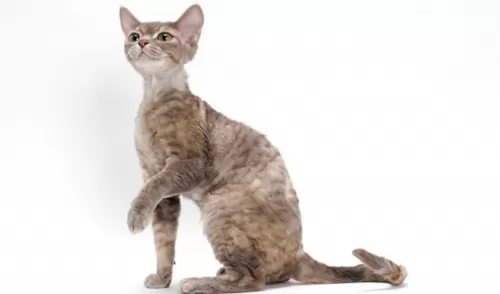 The Devon Rex is a cat known for its large ears and its curly, soft coat. It hails from England, emerging in the 1950s.
The Devon Rex is a cat known for its large ears and its curly, soft coat. It hails from England, emerging in the 1950s.
The cat is recognized by quite a few cat associations. The first of these cats was discovered by Beryl Cox in 1959 in Buckfastleigh, Devon. When the cat started appearing in cat shows in the UK, people starting becoming interested in owning these unusual cats.
 The Thai cat is also referred to as the Wichien Maat. It is an old cat breed descended from the cats of Thailand.
The Thai cat is also referred to as the Wichien Maat. It is an old cat breed descended from the cats of Thailand.
The Wichienmaat is a cat that was spoken of already centuries ago in a book. Over the years, the cat has remained much the same as its original breeding. Today this cat is popular in Thailand.
It was in the late 1800s that the Wichienmaat was imported to the West by British cat breeders, and the cats became known as ‘Siamese’.
Western breeders wanted to add in some other qualities to the cat and through selective breeding, they developed a finer-boned type of Siamese cat. Today some people refer to these cats as Old-Style Siamese, while others refer to them as Thais, but they are one and the same.
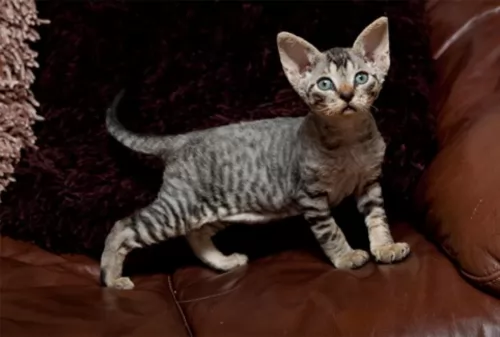 Known for its slender, light build, and weighing roughly between 2 and 4kg, the medium-sized Devon Rex has large, rounded ears. It is the large, rounded ears, set low on the sides of the broad head that make it slightly gremlin-like in appearance.
Known for its slender, light build, and weighing roughly between 2 and 4kg, the medium-sized Devon Rex has large, rounded ears. It is the large, rounded ears, set low on the sides of the broad head that make it slightly gremlin-like in appearance.
Their eyes are also large, and their noses are slightly upturned. It’s short, curly coat is another unusual feature and comes in many colors and patterns. The eyes can be blue, yellow, copper or he can be odd-eyed.
Your Devon Rex is quite a naughty cat, enjoying getting up to all kinds of mischief. Energetic, they love leaping up high onto perches so you’ll often find your Devon Rex in odd spots, more so if it's a spot in the sun as he loves warmth. It is why it is important to buy a cat tree for this cat.
It’s a loving, loyal cat and it will attach itself to one member of the family and then they are capable of pouring out the love and affection on this particular person. They’re also playful cats, as well as being intelligent.
He can learn a few tricks and can also be trained to walk on a leash. This is an active, energetic breed and will provide his human family with hours of amusing entertainment.
 The Thai is a short-haired, glossy cat and comes in a variety of colors but no white.
The Thai is a short-haired, glossy cat and comes in a variety of colors but no white.
The soft, silky fur is a warm cream shade, much like the Siamese, with dark brown, black, smoky colored extremities.
The Thai is considered to be a medium-sized cat and he will weigh between 3 an 6kg. The body is lean, slender and muscular, the ears medium size with rounded tips and set wide apart. The eyes are are beautiful blue, large and slightly slanted.
Thai cats are curious, active, and intelligent. They are also social and vocal and are able to communicate to their human owners what they want.
They thrive on getting lots of attention from their humans and will even follow them around the house. They do well with children in the home when the children have been taught to be kind and respectful to animals.
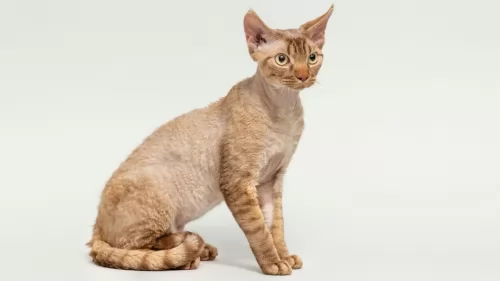 Your Devon Rex is a social cat and is happy to be found on your lap. He doesn’t take kindly to being left on his own though. He isn’t a suitable fit for someone who works all day.
Your Devon Rex is a social cat and is happy to be found on your lap. He doesn’t take kindly to being left on his own though. He isn’t a suitable fit for someone who works all day.
If you love animals, then maybe another companion animal would be a good idea as he is an amicable cat and gets on well with other animals.
When you spend time with your cat, make sure it is a special time, full of treats and stimulating play as he will learn to even fetch a small ball.
Just give him lots of attention and he’ll be your provider of companionship and entertainment.
 The Thai cat is social and friendly and enjoys time spent with his human family. They don’t like to be left alone for long periods of time and it just might be a good idea to have a feline friend for this cat.
The Thai cat is social and friendly and enjoys time spent with his human family. They don’t like to be left alone for long periods of time and it just might be a good idea to have a feline friend for this cat.
He is also a vocal cat and lets you know his feelings and certainly when he wants his food. The Thai wants to be your friend and companion and he will thrive in any kind of home when he is made to feel important and loved.
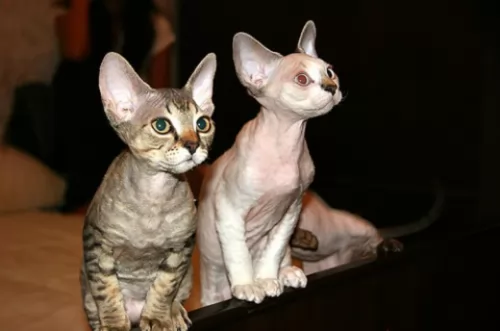 This particular cat isn’t known for any extreme health issues but even so, there are some health problems that are important to know about -
This particular cat isn’t known for any extreme health issues but even so, there are some health problems that are important to know about -
This is where the patella or knee cap moves out of its usual spot. It can occur because of a number of reasons such as an injury or congenital malformation. The vet will want x-rays because sometimes hip dysplasia is also present.
This is an inherited condition seen in both male and female cats and usually in young kittens. The cat has an odd gait with a head that bobs along as is tries to walk. The cat has tremors and also has difficulty with swallowing. With a visit to the vet and special care, your cat can do well.
 These cats are known for their good health. Just because he is considered healthy, you can't ignore looking out for signs that he may be in distress.
These cats are known for their good health. Just because he is considered healthy, you can't ignore looking out for signs that he may be in distress.
There are actually a whole lot of common cat illnesses your cat could succumb to, so you want to be sure you recognize some of the signs such a vomiting, diarrhea, lethargy, and battling to urinate. Make sure that the eyes are always bright and clear and that he is his active self.
Have your Thai cat vaccinated against the deadly cat diseases that there are. You will also need to have your cat dewormed. Speak to your vet about the best way to prevent fleas.
 The Devon rex cat breed is known for its unusual looks with its wavy fur, large ears and large eyes. It is considered a rare breed and you want to make sure that you take proper care of him.
The Devon rex cat breed is known for its unusual looks with its wavy fur, large ears and large eyes. It is considered a rare breed and you want to make sure that you take proper care of him.
Owners of the Devon Rex know that these cats love their food and it has to be top quality food to enhance good feline health.
Cats are carnivores, ad this actually means that they should stick to a meat diet. Any food you buy your cat should be mainly meat. Look at the packaging of the commercially manufactured cat foods you want to buy, and make sure that the first few ingredients are some sort of meat.
Remember that any uncertainty with feeding your cat, you can chat with your vet.
Keep the inside of your cat’s ear free of an accumulation of wax and dirt as well as infection. If you don’t like the idea of probing in your cat’s ears, be in contact with your vet or a reputable, professional cat groomer.
Trim the cat’s nails.
Check inside his mouth for bad teeth as this could be causing him pain.
Clean your cat’s litter box every single day and also replace the grit regularly.
Get your cat veterinary care as soon as he shows signs of illness. Certainly, make sure all his vaccines and deworming are up to date.
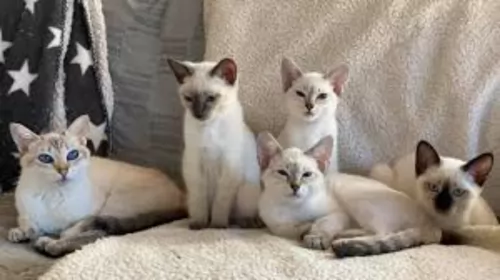 You’ll see your Thai cat preening and grooming, but he will still need to have the silky coat brushed gently to keep it shiny and healthy.
You’ll see your Thai cat preening and grooming, but he will still need to have the silky coat brushed gently to keep it shiny and healthy.
The brushing will make him happy as he just loves the attention, and it is good for the cat’s fur – to remove dust and loose hairs.
Your Thai cat is a scratcher just like any other cat, and if you don’t want to have your furniture scratch, invest in a scratching post.
Examine the inside of your cat’s ears to make sure they are clear of dirt and wax that could cause infection.
Some people say you should brush your cat’s teeth, but this can be too traumatic for your cat. Pets have always done well without their teeth being brushed. It can frighten your cat so much, he’ll want to scratch you.
Your Thai is an active, energetic cat, and you will want to provide him with a cat tree for climbing.
Provide your cat with feeding- and drinking bowls, litter box, warm, soft bed and toys to keep him occupied. It is always a good idea to put a collar on your pet and an ID disc in case he runs away.